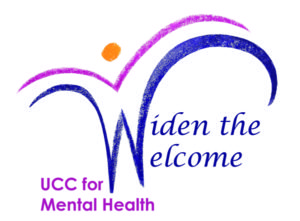 From Kim Williams
From Kim Williams
May is Mental Health Awareness Month, and I would be remiss if I didn’t say something about it. Mental Health is a tough subject to talk about because it is so broad and carries such stigma, even though one in five adults experiences mental illness in a given year.
On Sunday our Pews fit 6 adults fairly comfortably. That means that at least one person per pew could be affected by one mental health issue or another—or multiple at once. With numbers like that, why don’t we talk about it more?
Let’s Talk.
During a particularly dark period with depression, I reached out to my friends and family on social media to explain how difficult it was for me to get out of bed, let alone answer the phone. It was an apology for being a crummy friend, but also a way to say “I struggle with this, if you do too, you’re not alone.” The response from my friends was overwhelming, hundreds of them came back with, “Me, too.” And “You’re doing great, thank you for being brave enough to let us know.” A few sent private messages saying they are in the middle of it too, and what were my coping mechanisms? I felt lighter than I had in months. Having to keep darkness tethered closely is a surefire way for it to continue to deepen.
Unfortunately, the next day I was told by a few people, “If you don’t take that down, you’ll never find a job again.”
“People talk, and people judge.”
“This is going to have an effect on the custody of your children.”
“You’re not fit to be a mother if you have to rely on a therapist and medication to pull you through.”
“I’m only saying this because I care about you.”
What had been a revelation and intense, immense, immediate relief became reproach. I know my own experience is not unique and that is why I’m sharing this. We don’t talk about it because when we do the danger of being misunderstood—or worse, chastised and threatened—for daring to talk about who we are and how we were created presents a scary conundrum. Ultimately, I made that post private. The only thing more harrowing than falling further into the hollow nothingness of depression was the thought of people concluding that I’m a bad mother.
I’ve become more comfortable with my brain since that experience—God obviously thought it was a good idea to toss depression, anxiety, and ADHD my way, and I think some my best qualities were born of working with those factors. Unfortunately, positive spin doesn’t change the impact of that first feeling of shame, or that it makes me pause before I talk about mental health.
 UCC Churches across the denomination observe Mental Health Sunday on the third Sunday in May. The slogan is “Widen the Welcome,” and a key component of this is making our congregation a safe place for free discussion of any range of health issues, including and especially mental health.
UCC Churches across the denomination observe Mental Health Sunday on the third Sunday in May. The slogan is “Widen the Welcome,” and a key component of this is making our congregation a safe place for free discussion of any range of health issues, including and especially mental health.
Remember that just because we don’t wear our diagnoses on our name tags we are here among you. (And for a few of us, myself included, that would be one long name tag!) We’re cheerfully shaking your hand during coffee hour and fighting back our social anxieties in the car before we even walk through the Narthex doors. We’re medicated, or not—some by choice, and some of us by less-than-stellar insurance options. Some of us share our experiences freely, while some of us don’t like talking about it. Speaking for myself, I’m hoping that if the topic ever came up, the people in my congregation would embrace the beautiful and complex—if tricky— way that God has wired my brain.
For the remaining days of May take a moment to learn more about mental health. Look into the resources available and see how you can widen the welcome whenever the topic of mental health pops up.
10 Things Community Leaders Can do to Make the World a Better Place for People With Mental Illnesses